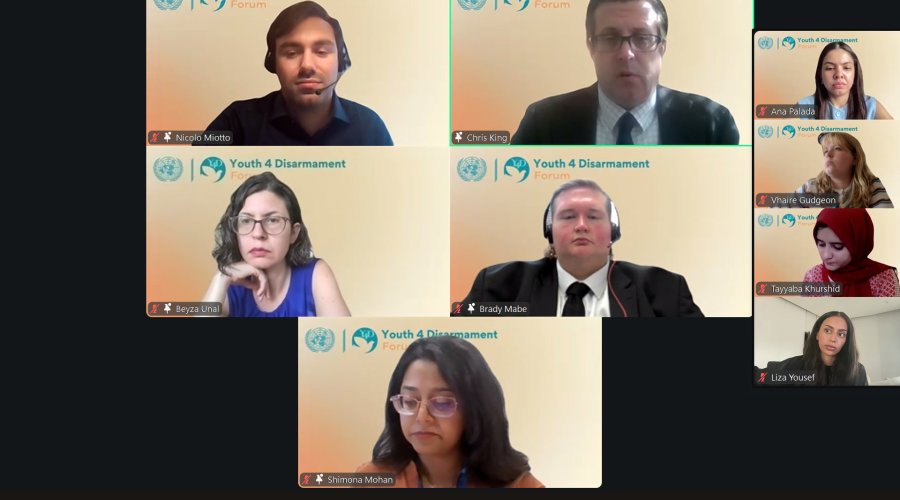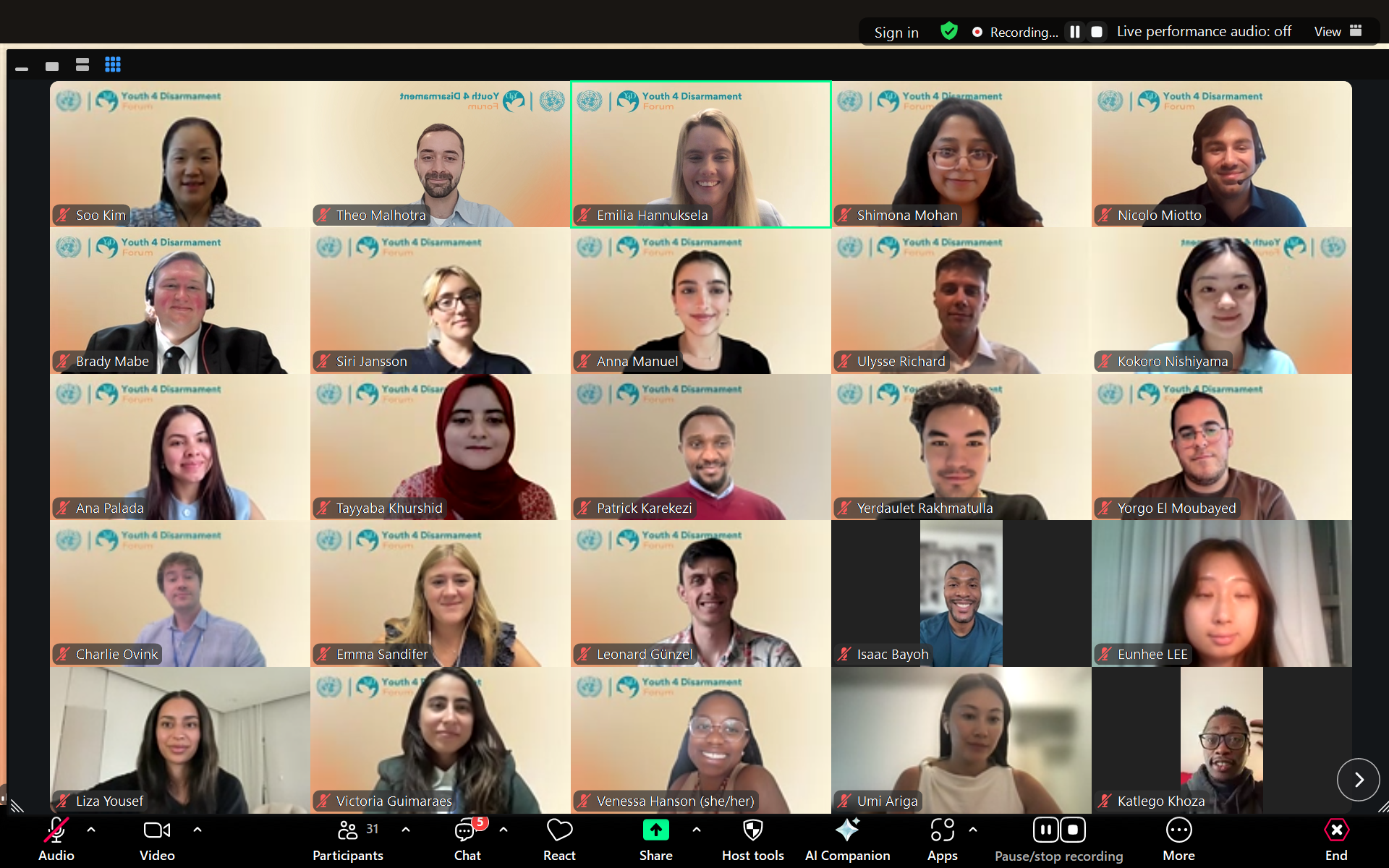News story
Youth Leaders Map the Nuclear–AI–Cyber Nexus and Call for Action

25 July 2025 — The second UN Youth4Disarmament Forum webinar plunged young leaders into one of today’s most complex security puzzles: the growing convergence between nuclear weapons, artificial intelligence (AI), and the cyber domain.
The Webinar explored the nexus through an expert panel discussion moderated by Nicolò Miotto, a Forum participant and Project Assistant at Organization for Security and Co-operation in Europe (OSCE). Christopher King, Chief of the Weapons of Mass Destruction Branch at UNODA, opened the panel by providing an overview of the current state of nuclear weapons globally and reflecting on the implications of artificial intelligence for their development and governance. He stated that although global stockpiles are smaller than during the Cold War, “instability is growing” amid multipolar tensions and rapidly advancing technologies. He noted that an estimated 12,000 nuclear weapons remain in the world, while emerging domains such as outer space and cyberspace add new layers of risk. He concluded by suggesting that the 2026 Review Conference of the Treaty on the Non-Proliferation of Nuclear Weapons (NPT) would be a valuable opportunity to explore ways in which technology can be leveraged to address these threats.
Taking a more technical approach, Beyza Ünal, Head of UNODA’s Science and Technology Unit, emphasized that innovations do not occur in isolation. AI, quantum computing, and cyber technologies increasingly share infrastructure with nuclear command, control and communication systems, “accelerating each other’s impact and magnifying strategic risks.” She highlighted quantum computing’s threat to encryption protocols that secure critical functions, including nuclear launch protocols and early warning data transmissions. This emerging vulnerability, she warned, demands urgent multilateral cooperation and coordinated national action.
The discussion then shifted to the human dimension of the issue. Shimona Mohan, a Forum participant and Associate Researcher at the United Nations Institute for Disarmament Research (UNIDIR), highlighted persistent gender gaps in the context of the nexus between nuclear weapons, AI, and the cyber domain.
She noted that only one‑third of disarmament delegates were women, while women represent fewer than ten per cent of software engineers. “Tools built in male‑dominated spaces can embed narrow assumptions,” she cautioned, citing a recent experiment where mainstream chatbots reproduced stereotypes about women diplomats. She pointed to initiatives like the UNIDIR Women in AI Fellowship as signs of progress.
Brady Mabe, legal adviser of the International Committee of the Red Cross (ICRC) explored the intersection between new technologies and International Humanitarian Law (IHL). Nuclear weapons, he argued, are fundamentally incompatible with IHL’s principles of distinction and proportionality. He also warned that AI‑driven decision support could accelerate unlawful attacks by shortening the time for human review. He issued three calls to action: complete nuclear disarmament; clarify IHL’s applicability to cyber operations; and ensure robust human oversight of all emerging technologies.
The webinar finished with an interactive Q&A segment that re-emphasized the importance of including youth, as digital natives, in shaping technology policy and disarmament affairs in order to make this field more diverse, collaborative and inclusive.

Youth Shape Actionable Recommendations during Breakout Sessions
During a breakout session, six groups consisting of youth Forum participants discussed and proposed practical steps to translate expert insights and lived experiences into policy recommendations. Each group presented concrete proposals aimed at making nuclear disarmament and technology policy more inclusive, actionable, and globally representative. The plenary discussion was facilitated by Charlie Ovink, Political Affairs Officer at UNODA, who leads the Responsible Innovation of AI for Peace and Security project. He encouraged participants to keep inclusivity front and center as they draft the Forum’s outcome document and said, “Technology timelines are accelerating, but so must our collective imagination.”
The first group, represented by Nicolò Miotto, called for mechanisms to prevent the dominance of the same voices in nuclear-tech spaces. The group questioned existing selection processes and proposed the creation of regional coordination hubs to ensure broader and more diverse participation.
The second group, represented by Yorgo El Moubayed, emphasized the need to align political and technological timelines. They also advocated for the use of cross-cutting issues such as climate, peace, and digital governance to bridge and connect disparate policy agendas.
The third group, represented by Kokoro Nishiyama, advocated for greater interagency dialogue with broad gender, geographic, and disciplinary representation. The group called for practical support for Global South inclusion through localization and travel grants.
The fourth group, represented by Tayyaba Khurshid, called for the disarmament debate in South Asia to move beyond graduate classrooms to broader public and youth spaces. The group also emphasized the importance of cultural localization, rather than solely the linguistic translation of disarmament discourse.
The fifth group, represented by Ana Palada, stressed the need to empower and incorporate local leaders’ perspectives into global frameworks. Finally, the sixth group’s presenter, Yerdaulet Rakhmatulla, highlighted institutional and structural barriers, such as visa privileges, that exclude key participants from international dialogue.
The ideas generated in these discussions will feed into the Forum Outcome Document, which will be launched during the in-person Youth4Disarmament Forum at UN Headquarters in October.
Follow the journey on Instagram @youth4disarmament and add your voice using #UNYouth4DisarmamentForum.
For more information, check out our website or contact the UNODA Youth4Disarmament Team at youth4disarmament@un.org.
Co-authored by UN Youth4Disarmament Forum participants:
Joël N. Christoph, Founder of 10Billion.org; Fellow, Harvard Kennedy School; Advisory Board Member, BASIC Emerging Voices Network.
Yerdaulet Rakhmatulla, the Co-Founder of ASQAQ Koalitsiyasy / Qazaq Nuclear Frontline Coalition (QNFC) and Founder & CEO of JASA
Ana Palada, Co-Founder of Centuria / UPEACE Alumni / and Board Member of El Milenio